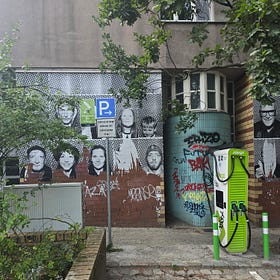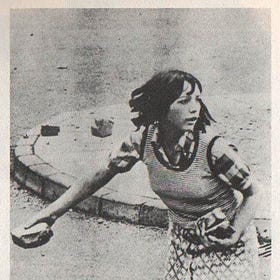
A world of work
While much of the class struggle is taken up with the everyday conflict between worker and boss, at its heart, the concept of class struggle is not merely a description of a situation of differing interests. Rather, it points to the space in which the human social form is determined.
A World of Work #2
If, for a moment, work appeared on the horizon as a space of liberatory potential, albeit in a transformed future, the reacapturing of the majority of us in mundane work, of domesticating and pacifying work, has proved to be far more widespread.
A World of Work #3
In the 40-odd years since Communists Like Us, we have seen how capital has, albeit slowly, reorganised itself and its flows to re-colonise the new forms of consciousness. However, the dynamics that developed as part of the process of re-colonising our consciousness have their roots in the shifts that Guattari and Negri are grappling with.
A Word of Work #4
Communism doesn’t simply grow into being, unless you’re happy to rest on a crude economic determinism which allows no reality to the political. Communism has to be created. The problem is that while it may be a necessary condition that communism has to be created through a political act it is not a sufficient one. Whilst the necessary conditions of communism and a post-capitalist society are political, what exactly are the sufficient conditions?
A World of Work #5
Concepts have a life and tracking their processes of development is crucial if we are to be able to understand the meanings or usages of a concept. Work, like almost all concepts, has a history, and what it means for me to work today, in my here and now, is not the same as what it means elsewhere, elsewhen.
A World of Work #6
Tracking a materialist analysis of anything, from work to time to motorcycles to microscopes, should not involve a focus on some object or need, nor is it totally accurate to simply talk about production. Rather, it should be focused on the things that are forces and how something - some object perhaps, or some function or process - finds itself put to work in the service of those forces.
A World of Work #7
The need for an analysis or theory of work is only called into existence if we already suspect work of hiding something. This experience, of something not being right, of something not quite fitting, it’s this that must be presupposed before there is even a problem of work. The problem, after all, must first be felt as a problem, only after which can any attempt to think it begin, however falteringly.
A World of Work #8
Bad ideas lead to bad things, is the basic thesis of liberal theorists of domination and power. Which is, let’s say, naive, or simplistic. Bad ideas, good ideas - often things happen in spite of, not because of such things. Domination isn’t caused by bad people, nor prevented by good people. Rather it takes place as a set of relations.
A World of Work #9
One of the things that makes autonomist marxism interesting is that it broke free of the mind-numbingly dumb version of marxist thought that still dominates much of the left. Key to breaking free from stupidity was paying attention to what was taking place in front of their eyes.
A World of Work #10
The moment we think of work beyond necessity, it offers some possible freedom. It’s this connection to freedom that makes the focus on autonomy and the idea of the refusal of work resonate. What form might the material value of work take, over and above, within and beyond, the capitalist form of value extraction?
A World of Work #11
Whilst recognising political organising as work might remind us of the difficulties, it also points to the important political content of the activity. As communists and anarchists, we not only have to think about power, domination and confrontation with the existing capitalist system, but we also have to think about how to nurture the potential of a positive form of organising work.
A World of Work #12
This relation between work, wage and labour contains within it, within capitalism, a struggle to defend life from death. This is no doubt to extend outwards from Marx in such a way as to perhaps appear unrecognisable. The point of connection, however, is to be found within Marx’s distinction between living and dead labour.
A World of Work #13
In the passage from the “Mass worker and Social worker” essay that I was discussing last time, that curious idea of one thing being ‘internal to’ another thing, in this case class consciousness being ‘completely internal to’ class composition, was the focus. It had stuck out, like a philosophical red light, primarily because of the qualifier ‘completel…
A World of Work #14
To sum up Negri's exposition of Marx's line of argument in the Grundrisse: capitalism is a social system with two subjectivities, in which one subject (capital) controls the other subject (working class) through the imposition of work and surplus work. The logic of this control is the dialectic which constrains human development within the limits of cap…
















